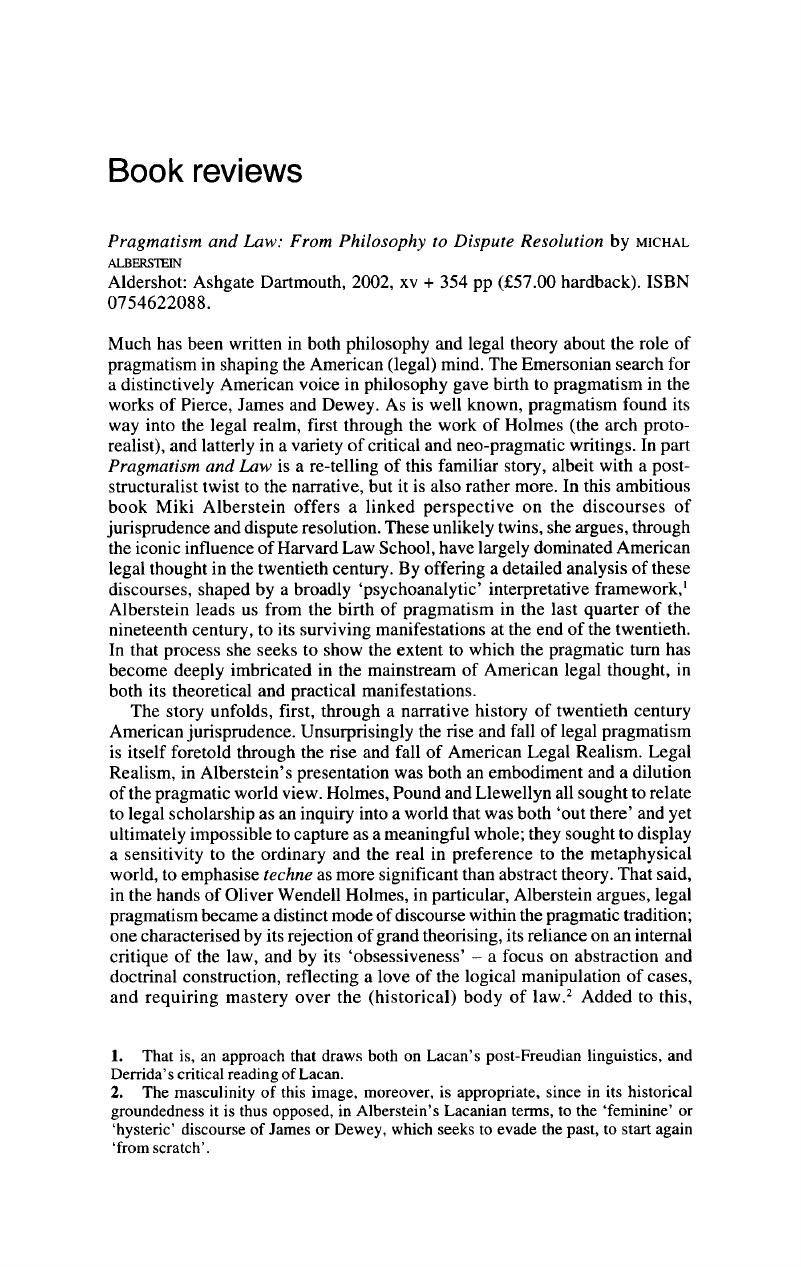No CrossRef data available.
Published online by Cambridge University Press: 02 January 2018

1. That is, an approach that draws both on Lacan's post-Freudian linguistics, and Derrida's critical reading of Lacan.
2. The masculinity of this image, moreover, is appropriate, since in its historical groundedness it is thus opposed, in Alberstein's Lacanian terms, to the ‘feminine’ or ‘hysteric’ discourse of James or Dewey, which seeks to evade the past, to start again ‘from scratch’.
3. See, for example, D Kennedy and P Gabel ‘Roll over Beethoven’ (1984) Stan LR 36; D Kennedy A Critique of Adjudication (fin de sièle) (Cambridge, Mass: Harvard University Press, 1997).
4. This is highlighted by the sub-title to chapter five of Pragmatism and Law - ‘Some Private Hope and Public Irony’– a conscious reference to and inversion of Richard Rorty's ‘Public Hope and Private Irony’.
5. It is, for example, discussed in virtually none of the current English texts on jurisprudence.
6. For the latest edition, see R Fisher, W Urry and B Patton Getting to Yes (New York: Random House, 2003).
7. See p 273ff; the pragmatic influence in Dworkin's writing has previously been observed by other writers, notably Rorty, despite Dworkin's overt hostility to such association.
8. Patterns of American Jurisprudence (Oxford: Oxford University Press, 1995). Surprisingly, this is not referenced by Alberstein.
9. Realistic Socio-Legal Theory: Pragmatism and a Social Theory of Law (Oxford: Clarendon Press, 1997).
10. Cp A Carty ‘Scandinavian Realism and Phenomenological Approaches to Statehood and General Custom in International Law’ (2003) 14 EJIL 817 at 836–841 - using Husserl's notion of identity to bring an element of reflexive phenomenological analysis into understanding obligation as the ought within the self.
11. As an aside on the text, the failure of legal pragmatism to engage seriously with Dewey's attempts to construct an ethical pragmatism is itself an interesting example of one of many corresponding failures of ‘real’ philosophy and jurisprudence to talk to each other at the level of an ethico-juridical discourse. This ethical failure of pragmatism appears to have been a source of far greater unease for British than American Critical scholarship - for a brief summary, see, for example, R Cotterrell The Politics of Jurisprudence: A Critical Introduction (London: Butterworths, 2nd edn, 2003) pp 253–254.
12. The shift from epistemology to ontology may seem something of a jump, but it is necessary if we are fully to acknowledge the ‘beingness’ of identity. This ‘leap into the ontological’ - G Deleuze Le Bergsonisme (Paris: Presses Universitaires de France, 1966) pp 51–52 - is certainly a premise of phenomenological thinking from theorists as diverse as Bergson and Levinas. Cp also Gillian Rose's discussion of Bergson and Deleuze Dialectic of Nihilism (Oxford: Blackwell, 1984) ch 6.